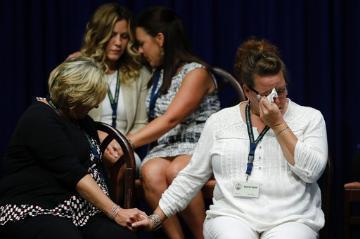
Hana Callaghan directs the government ethics program at the Markkula Center for Applied Ethics at Santa Clara University. The opinions expressed are her own.
The Pennsylvania grand jury report alleging sexual abuse of children by over 300 priests has shaken the nation. Many are calling for a government response, prompting the question, What can government do? One thing state legislatures might consider is to change their state’s statute of limitations for child sexual abuse cases. It is not unusual for child victims of sexual crimes to remain silent until years later—either out of fear of the perpetrator or because of the perceived stigma attached to being a victim of such a crime. In the Pennsylvania report, out of the 300 priests charged, only two can be prosecuted. Criminal prosecution of the other cases is time-barred by the applicable Pennsylvania statute of limitations. The rationale for statutes of limitations in criminal actions is that the more time passes between the commission of a crime and the prosecution of it, the less reliable evidence becomes because memories fade and witnesses die or become incompetent to testify.
There is a bill currently before the Pennsylvania legislature that would eliminate the time limitation for bringing criminal charges in these kinds of cases. (The current law allows a child victim of sexual abuse to file criminal charges until age 50). If the Pennsylvania legislature passes Senate Bill 261, they will join a growing number of other states who have taken this legislative action. California eliminated its criminal statute of limitations for sexual assault of a child in 2016. The ACLU is on record opposing this trend. They fear eliminating statutes of limitations will result in innocent people convicted of crimes that they did not commit based on untrustworthy evidence.
It should be noted that changing the statute of limitations now will not open up the courts to the Pennsylvania victims in the report whose cases are barred by the current time limitations. The U.S. Supreme Court opined in Stogner v. California in 2003 that a change of a statute of limitations cannot be retroactively applied to crimes which were committed prior to the law’s change. The Court held that retroactive application would violate the constitutional ban on ex post facto laws.
Even though many of those Pennsylvania victims will not get their day in criminal court, action by the Pennsylvania legislature eliminating the statute of limitations for childhood sexual abuse will help abuse victims going forward. There is precedent for excluding egregious crimes from time limitation laws. For example no state has time limitations for bringing murder cases. In California a criminal charge involving embezzlement of public money can be brought at any time. By eliminating the statute of limitations barring prosecution of child sexual assault cases, the state of Pennsylvania will send a strong message that child sexual abuse by adults is a serious crime, will not be tolerated, and that perpetrators will no longer be able to use the passage of time to escape judgment.